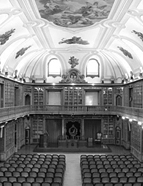

It may even be said that the so-called "Macedo Question", which pitted Herculano against the perpetual secretary Costa de Macedo between 1854 and 1857 (thus beyond the chronological scope of this article), was motivated not only by personal prestige but, more significantly, by opposition to outdated methods of organising and cataloguing the ACL’s bibliographic collection, as well as its funding, publishing processes, and the timely processing of minutes and decisions made in assemblies. Although Herculano’s opposition to the lack of scientific and innovative historical work published by the Academy following its statutory reforms of 1834 and 1840 is largely unacknowledged, it is likely that he envisioned a role for the ACL similar to that of French, German, and British academies at the time: centres for debate, publication, and the confrontation of ideas and historical documents, with the aim of understanding the past and planning for the future—another of the programmatic ideals of the 1780 statutes, reiterated by Correia da Serra. This required a reorganisation of the statutes, which were revised in 1851, and, above all, a kind of palace revolution in which Costa de Macedo resigned as a member and perpetual secretary of the ACL in 1855 and was retired from his position as chief guardian of the Torre do Tombo in 1857. Only thus were Herculano and a group of companions and disciples (Rebelo da Silva, Mendes Leal, and Oliveira Marreca, among others) able to restore the ACL to a level of operational capacity and prestige that it had not experienced for some time, which would characterise it as a centre of excellence throughout the final third of the 19th century and influence at least the first third of the 20th century. While Costa de Macedo resurrected the Academy from the ashes in 1833, Herculano did the same for Portuguese historiography via the ACL between 1852 and 1857, even though he refused to teach in the Curso Superior de Letras, created under the institution’s aegis in 1859. Let us see how by examining two sets of factors. Herculano, as librarian of Ajuda and Necessidades and vice-president of the Academy, was entirely devoted to the continuation of the História de Portugal and the Portugaliae Monumenta Historica, in a Regeneração partially inspired by his ideas of progress and reconciliation. He also influenced the academic statutes, which would remain in force until 1935, and the Curso Superior de Letras, which would lead to the professionalisation of historians/researchers, sharing their time and funding their work through specific training and academic careers (for example, with the foundation of the Faculdade de Letras de Lisboa in 1911).
